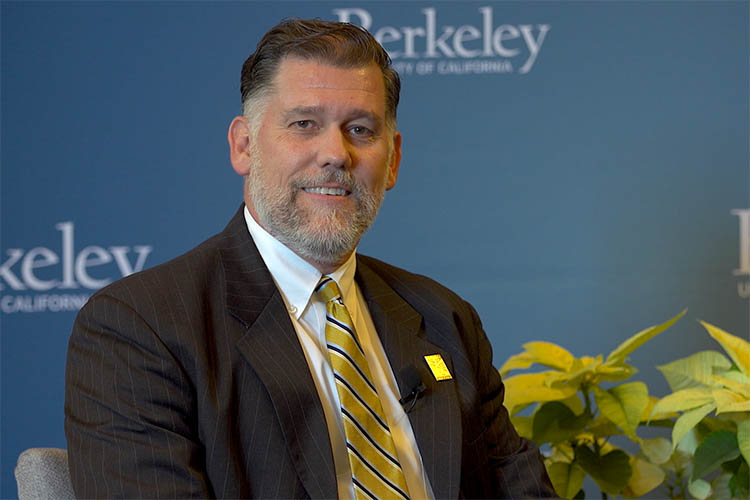Building a resilient, connected student body
VC Stephen Sutton speaks about student experience at Wednesday's Campus Conversation

March 20, 2019
How do you create a student body that is healthy, resilient and connected by a shared commitment to take on the world’s hardest problems?
That’s the task of Stephen Sutton, UC Berkeley’s vice chancellor of student affairs, who oversees almost all aspects of student life on campus: residence halls, dining commons, leadership development, mental health counseling, basic needs, admissions, orientation programs for new students, student discipline and club sports, among other topics.
“The job has become a lot more complicated in the last few years,” Sutton said Wednesday during the latest installment of Campus Conversations — monthly events where top Berkeley leaders take questions from staff, faculty and students.
Many of Berkeley’s students come to campus at age 18, leaving home and protective parents for the first time and looking to get an education and grow into independent adults, he said. His staff of 1,500 full-time employees and 2,500 student workers continually strive to best manage that process.
“We can hopefully build the correct balance between challenge and support,” he said. “We want our students to be resilient, we don’t want them to feel like we’re going to hand them everything — and I don’t think our students feel that way — but we also don’t just throw our students into the deep end of the pool and expect them to swim.”
The key, Sutton said, is to develop programs that give students what they want: chances to engage with the world, develop lifelong relationships, find meaningful careers and learn to bounce back in the face of adversity.
But doing that is not easy or one-size-fits-all, said Sutton, who was the first in his family to attend college and is now the father of a college freshman.
“We also know that the college student experience is very unique, depending on the student, where they come from, what they study, what they want to major in, who they live with,” he said. “We have to be very versatile in the way we do our work, because we know that students approach their college experience in very different ways.”
Sutton said his top goals include focusing on four main areas of the student experience: improving how students find resources on campus, helping them develop connections with each other, improving their wellness and making sure his staff structure is organized so it can be most effective.
He also pledged to listen to students, pointing out, as an example, a meeting he held Tuesday evening with his student advisory board to discuss an incident involving the campus police department.
“We want our students to keep us honest,” he said. “We want to be the best place we can be.”
Jennifer Bridge, a career adviser for MBA students at Haas School of Business, said she came to Campus Conversations to hear Sutton’s ideas for preparing students for life after graduation.
A growing number of MBA students expect Haas to provide them with a job-search plan, she said.
“We’re really struggling with that, because in the real world, no one gives you a checklist,” she said.
Hearing from Sutton helped her consider how to balance support for students with their need for independence and “how to be nimble when your student population is changing,” she said.
The next Campus Conversations event is Wednesday, April 18, with speaker Christine Treadway, assistant vice chancellor for Government & Community Relations.
Contact Will Kane at [email protected]